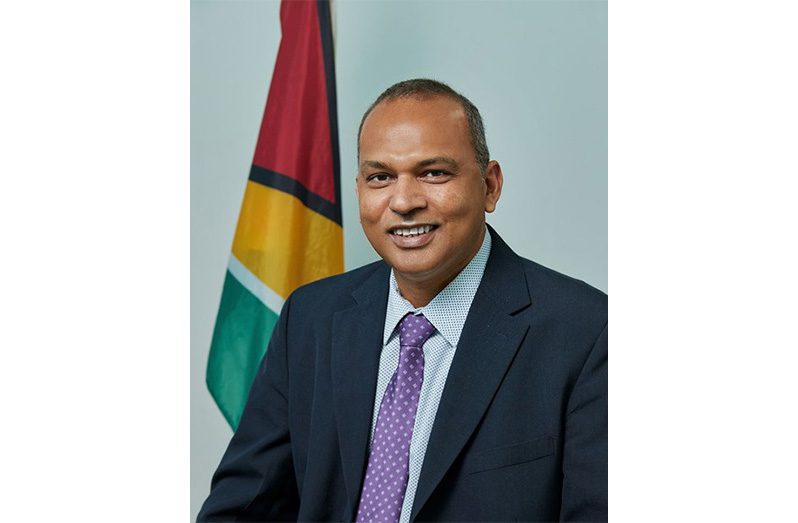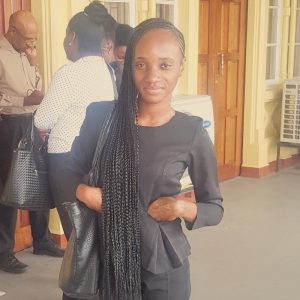MINISTER of Health Dr Frank Anthony has underscored the growing importance of allied health professionals in Guyana’s rapidly modernising healthcare landscape, pointing to major advancements in digital health, research, and medical technology that will demand new skills and regulations.
Delivering remarks at the Allied Health Conference on Saturday, at the Ministry of Health’s Brickdam Headquarters, Dr. Anthony highlighted the evolving role of allied health workers as the ministry rolls out transformative initiatives such as electronic health records, artificial intelligence (AI) applications, and robotic surgery.
“We are also, at the Georgetown Public Hospital as some of you know, in the process of rolling out electronic health records,” the minister said. He explained that while doctors and nurses will help create patient records, “we also would have a group of technical people, in case the platform goes down and we need some assistance”.
Dr. Anthony announced that the ministry will soon be launching an institute to train digital health technicians, with a specialised curriculum developed in partnership with Mount Sinai Health System and supported through the Greater Guyana Initiative, which has provided US$5 million in funding.
“In the next month or so, we will be launching an institute to train these digital technicians, and this is a programme that we’d be working on with Mount Sinai,” he said, adding: “We have just completed the curriculum, and the funding for this programme is being done through the Greater Guyana Initiative.”
As Guyana introduces new technology across its health system, Dr. Anthony noted that the rise of digital medicine will require regulation and the recognition of emerging professions. “The whole area of digital health is going to bring in new professionals that we didn’t have before, and we’ll have to find a way how regulate them,” he stated.
He pointed to the introduction of AI in medical imaging as another area transforming healthcare delivery. “At the Georgetown Hospital, they would have started doing some work in using AI to do interpretation of images. It’s going to be far more accurate in detecting patterns than the human eye,” he explained. Some AI software, he noted, have already reached “about 99% accuracy”.
Looking further ahead, Dr. Anthony said Guyana plans to introduce robotic surgery, which will require another set of specialised allied health professionals.
“Every movement that the robot would make, it is planned,” he said. “Before they even touch the patient, they’re able to plan everything in minute detail, so that when they go and start performing this, it is very, very precise.
“So, if you have a complex fracture, every fragment of that fracture, they plan how they’re going to move each piece of the bone, and how that is going to be fitted back. The robot is programmed in such a precise way as to ensure that you have optimum care.”
However, he cautioned that these advancements are not yet covered under existing legislation.
“We don’t have that in any part of our legislation, because we have never contemplated this,” he said. “We also don’t have the technicians to manage such pieces of equipment.”
Dr. Anthony also emphasised the need for more research across every field in allied health. “We have to also get maybe a body that can collate the different types of research that we have going on in the country,” he said, noting that many departments are unaware of ongoing studies.
Highlighting Guyana’s progress in health research, he pointed to work being done with Harvard University to improve malaria detection using digital microscopy.
“They have actually developed some technology where, once you put the slide under the microscope, it would upload it to a software in the ‘Cloud’, and there is an interpretation of that slide to tell you it’s what type of malaria,” he said. “We are the first country to have started doing that.”
The minister called for a return to Guyana’s long tradition of scientific research, recalling that as early as 1869, a doctor at the New Amsterdam Psychiatric Hospital had published a mental health journal. “We’ve had that tradition. Somewhere along the way, we’ve lost it, and I think we need to reclaim that,” Dr. Anthony said.
Turning his attention to health infrastructure, Dr. Anthony outlined plans for six new hospitals currently under construction, including at Moruka, Kato, Lethem, Ogle, New Amsterdam, and West Demerara, and the establishment of a specialised oncology hospital.
“We want in the next five years to be, or start becoming, the hub for medicine in the Caribbean,” he said. “It sounds like a very ambitious thing, but we are very confident that with the investments that we’re making, we can become the hub.”
He also highlighted future collaboration with Northwell Health, which operates New York’s largest ambulance network, to improve Guyana’s emergency medical services.
“You can expect over the next couple of years you will see a different arrangement in terms of emergency medical services,” he said. “We want to make sure that our ambulances; emergency medical personnel can provide care, active care, while getting that patient to the hospital.”
Concluding his address, Dr. Anthony encouraged continued professional development among allied health workers. “Once you stick with the profession and you constantly upgrade yourself, it is going to be a very fulfilling one,” he said. “It is important that we train, and we continue to train… because, if we’re going to improve practice, we have to constantly upgrade ourselves and provide opportunities where people can give more knowledge.”



.jpg)








